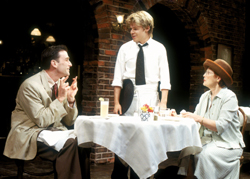
Review: Letter from Ethel Kennedy
Christopher Gorman, wrote his autobiographical play A Letter From Ethel Kennedy, currently at the MCC Theater, with the idea that Tony Award winner Joanna Gleason would direct his friend Anita Gillette. This has come to pass, but Gorman never saw his dream as he died in May 2001 due to complications from AIDS. It would be a pleasure to praise the work; regrettably, that is not possible.
This is an AIDS play that lacks the intensity of The Normal Heart, the insight of Falsettos or the scope of Angels in America . Beyond the superficial and oft-examined aspects of this terrible disease, the play focuses on the protagonist's search for love and recognition from his parents and his former lover by playing on their pity. While they reluctantly issue mea culpas he continues to be their eternal victim.
Kit Conway, a playwright, is dying. He arranges to meet separately and at different times with his parents, Bridget and Jimmy, in a restaurant where he used to wait tables. Matthew, a movie executive with whom Kit broke up several months earlier after a ten-year relationship, just happens to be in the restaurant after flying in from Los Angeles. Trying to salvage the relationships while saying good-bye resurrects latent antagonisms and sets the table for melodramatic accusations and revelations.
He arranges to meet separately and at different times with his parents, Bridget and Jimmy, in a restaurant where he used to wait tables. Matthew, a movie executive with whom Kit broke up several months earlier after a ten-year relationship, just happens to be in the restaurant after flying in from Los Angeles. Trying to salvage the relationships while saying good-bye resurrects latent antagonisms and sets the table for melodramatic accusations and revelations.
In addition to Kit the other characters have their own emotional and/or physical wounds. Except for a young waiter, they are all alcoholics or reformed alcoholics whose lives have been restricted by their Irish Catholic upbringing. Bridget, who is in remission from an unidentified cancer, and Jimmy have an angry marriage. Matthew longs for a male German prostitute with whom he spent one week when he was 21 years old. We are repeatedly informed that none of them satisfied with life.
The first act is almost one-hundred percent exposition, occasionally in the most blatant manner. The dialogue throughout the whole work is often turgid with rare sequences of lyrical observations on life. Gorman has also inserted one-liners that feel as if they were dropped in simply to get a laugh. Many of them are funny, but others fall flat because of delivery or line structure. Several recurring gags are sophomoric and unnecessary. Set in an unrealistically quiet Broadway district restaurant, the characters wait interminably for their lunches in the first act and are served too quickly in the second.
Gleason's direction has been compromised by the inherent requirements of the script which severely constrain movement and dictate lackluster and static staging. The development of a conflict onstage is dramatized by the physical placement of characters. If they are confined to a single location, i.e., a table, the collision of emotions is diluted and the developmental structure of the work is weakened. The characters, especially Kit, remain seated for lengthy periods requiring the actors to create business with the table props, but there is just so much that can be done with a napkin or a glass. With a lack of physical action the company has to focus on the dialogue which is not emotionally involving. In addition, none of the characters claims our minds or hearts since none of them is likeable.
The body of the play is a realistic drama (more or less) but Gorman introduces a jarring stylistic change toward the end of the work. Also in the final moments, the contents of a letter sent to Kit by Ethel Kennedy in response to his note of condolence after RFK's assassination is read. It is flagrantly sentimental and artificially ironic.
The acting is inconsistent. The strongest performance is that of Bernie McInerney as Jimmy, the least sentimental of all the characters. His cynicism is grounded in his inability to define what he feels so that he may avoid confronting his failure as a father.
In the first act Gillette plays Bridget as a flighty drunk in a comic mode that rings with superficiality. Her next appearance, when she is sober and in pain after life altering events of the previous year, is more sincere. She invests the soap opera dialogue with more credibility than it contains.
Jay Goede plays Kit within a finite emotional range of self-pity, rancor and sarcasm. Since he is such a negative presence, it is difficult to empathize with the character thereby dooming the play from the beginning. Stephen Barker Turner's Matt lacks substance because the character's qualities are indistinct and contradictory, qualities attributable to the script.
Gorman, who fashioned a career as a stage and television director, had a dream, but he did not look beyond himself to fulfill it.
This is an AIDS play that lacks the intensity of The Normal Heart, the insight of Falsettos or the scope of Angels in America . Beyond the superficial and oft-examined aspects of this terrible disease, the play focuses on the protagonist's search for love and recognition from his parents and his former lover by playing on their pity. While they reluctantly issue mea culpas he continues to be their eternal victim.
Kit Conway, a playwright, is dying.
 He arranges to meet separately and at different times with his parents, Bridget and Jimmy, in a restaurant where he used to wait tables. Matthew, a movie executive with whom Kit broke up several months earlier after a ten-year relationship, just happens to be in the restaurant after flying in from Los Angeles. Trying to salvage the relationships while saying good-bye resurrects latent antagonisms and sets the table for melodramatic accusations and revelations.
He arranges to meet separately and at different times with his parents, Bridget and Jimmy, in a restaurant where he used to wait tables. Matthew, a movie executive with whom Kit broke up several months earlier after a ten-year relationship, just happens to be in the restaurant after flying in from Los Angeles. Trying to salvage the relationships while saying good-bye resurrects latent antagonisms and sets the table for melodramatic accusations and revelations. In addition to Kit the other characters have their own emotional and/or physical wounds. Except for a young waiter, they are all alcoholics or reformed alcoholics whose lives have been restricted by their Irish Catholic upbringing. Bridget, who is in remission from an unidentified cancer, and Jimmy have an angry marriage. Matthew longs for a male German prostitute with whom he spent one week when he was 21 years old. We are repeatedly informed that none of them satisfied with life.
The first act is almost one-hundred percent exposition, occasionally in the most blatant manner. The dialogue throughout the whole work is often turgid with rare sequences of lyrical observations on life. Gorman has also inserted one-liners that feel as if they were dropped in simply to get a laugh. Many of them are funny, but others fall flat because of delivery or line structure. Several recurring gags are sophomoric and unnecessary. Set in an unrealistically quiet Broadway district restaurant, the characters wait interminably for their lunches in the first act and are served too quickly in the second.
Gleason's direction has been compromised by the inherent requirements of the script which severely constrain movement and dictate lackluster and static staging. The development of a conflict onstage is dramatized by the physical placement of characters. If they are confined to a single location, i.e., a table, the collision of emotions is diluted and the developmental structure of the work is weakened. The characters, especially Kit, remain seated for lengthy periods requiring the actors to create business with the table props, but there is just so much that can be done with a napkin or a glass. With a lack of physical action the company has to focus on the dialogue which is not emotionally involving. In addition, none of the characters claims our minds or hearts since none of them is likeable.
The body of the play is a realistic drama (more or less) but Gorman introduces a jarring stylistic change toward the end of the work. Also in the final moments, the contents of a letter sent to Kit by Ethel Kennedy in response to his note of condolence after RFK's assassination is read. It is flagrantly sentimental and artificially ironic.
The acting is inconsistent. The strongest performance is that of Bernie McInerney as Jimmy, the least sentimental of all the characters. His cynicism is grounded in his inability to define what he feels so that he may avoid confronting his failure as a father.
In the first act Gillette plays Bridget as a flighty drunk in a comic mode that rings with superficiality. Her next appearance, when she is sober and in pain after life altering events of the previous year, is more sincere. She invests the soap opera dialogue with more credibility than it contains.
Jay Goede plays Kit within a finite emotional range of self-pity, rancor and sarcasm. Since he is such a negative presence, it is difficult to empathize with the character thereby dooming the play from the beginning. Stephen Barker Turner's Matt lacks substance because the character's qualities are indistinct and contradictory, qualities attributable to the script.
Gorman, who fashioned a career as a stage and television director, had a dream, but he did not look beyond himself to fulfill it.
Copyright © 2008 randy-harrison.it | All rights
reserved
Written by Macey Levin - Edited by Marcy
Written by Macey Levin - Edited by Marcy